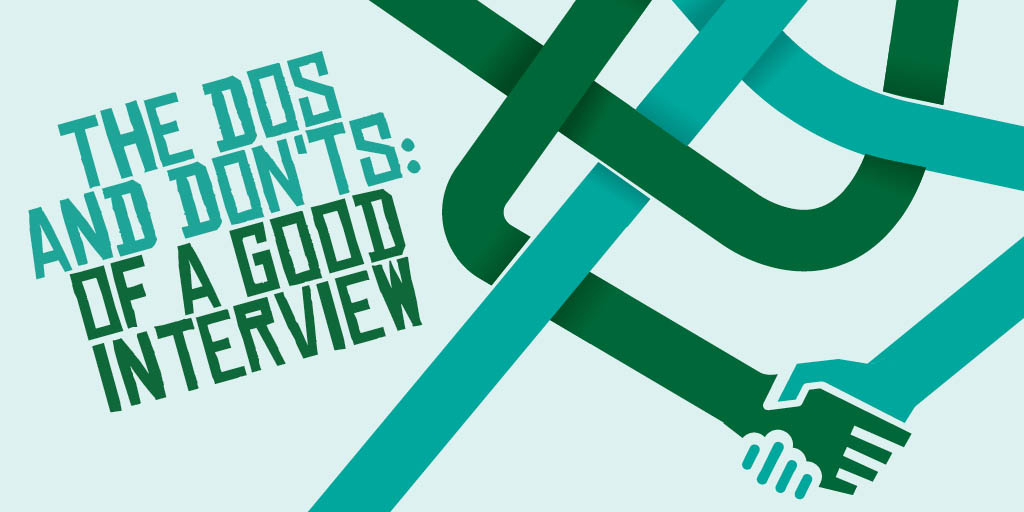The Dos and Don'ts of a Good Interview

Whether you are an experienced or a novice interviewee, going for an interview can be nerve-wracking. We've come up with some tried and true “dos and don'ts” that will boost your confidence and guarantee you leaving a good impression with your employer.
✓ Do: Come prepared.
It is important to do research beforehand on the company and the position you have applied for. Be familiar with the company's purpose, goals and initiatives to show an interest in the place you are hoping to work at. In addition, practicing answering possible interview questions will help you be more confident when answering under pressure, especially with the most famous and anticipated question “tell us some of your weaknesses.” Lastly, it is useful to brief yourself with your resume as you will likely be asked about some of your qualifications and previous work experience. If you can't think of possible interview questions, the good old trusty Google is a great place to search.
✓ Do: Plan your outfit the day before.
Arranging your outfit the day before is a big timesaver and will reduce your stress level the day of the interview. Also, it is important to make sure that your outfit reflects the company's expectations and shows professionalism. Planning your outfit beforehand gives you the time to buy an outfit if you aren't happy with the options in your closet.
✓ Do: Shake your interviewer's hand and smile.
Both show confidence, openness and genuiness. Continue to make regular eye contact throughout the interview; looking at your hands or looking away can be perceived as not being confident or having something to hide. At the same time however, make sure to blink. Your aim is not to stare them down.
✓ Do: Take a few moments to think about your answer if you can't think of something right away.
It is best to make sure you have an answer that is well thought out rather than blurt the first thing that comes to your mind and wish you had answered better.
✓ Do: Ask your interviewer questions after your interview.
It shows that you are thinking about how the job experience will be for you personally and gives you the opportunity to address any concerns or questions you may have. It also shows that you are interested in the job and were thinking analytically about it as the interview went on. It can be helpful to think of some questions before you go into the interview that you know you would like to have answered.
✓ Do: Send a thank you email.
It is good etiquette to send a brief and polite follow-up email to the employer to thank them for their time, reiterate your interest in the job and say that you look forward to hearing from them.
✗ Do not: Be late.
Tardiness at an interview can show a lot to an employer about your work ethic and how seriously you are taking the interview and the job opportunity. If you are late for an interview they assume you will also be late for your job.
✗ Do not: Lie.
It can lead to potential problems down the road, especially if you lie about a qualification and then on the job you cannot perform what you said you could. It can also lead to a lot of wasted time and energy keeping up with the lie and usually employers can see when a person is being disingenuous.
✗ Do not: Complain about previous jobs or coworkers.
Whether or not things were “your fault” at your previous job, if you had problems with people before, employees will suspect that it could happen again and that you may have been the cause of the issues.
✗ Do not: Check your phone.
This is a sacred time between you and your interviewee for them to get to know you and you to get to know them. And so, no, that like you just got on Instagram is not more important. Do not: Fidget or slouch. Body language is important. Slouching can show boredom or disinterest and while fidgeting can be a sign of nerves, it can be distracting.
✗ Do not: Interrupt your employer.
While the employer asking you questions and learning more about you is the reason you are there, allow your employer to speak. Interrupting can show that you don't value their thoughts or opinions and think that yours are better. You are not there to put words in their mouth. Wait for them to finish speaking because they may tell you some important information or answer the question you were about to interject with.














